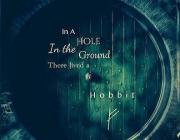John Ronald Reuel Tolkien, CBE (/ˈtɒlkiːn/ tol-keen;[a] 3 January 1892 – 2 September 1973) was an English writer, poet,philologist, and university professor, best known as the author of the classic high-fantasy works The Hobbit, The Lord of the Rings, and The Silmarillion.
He served as the Rawlinson and Bosworth Professor of Anglo-Saxon and Fellow of Pembroke College, Oxford, from 1925 to 1945 and Merton Professor of English Language and Literature and Fellow of Merton College, Oxford from 1945 to 1959.[1] He was at one time a close friend of C. S. Lewis—they were both members of the informal literary discussion group known as the Inklings. Tolkien was appointed a Commander of the Order of the British Empire by Queen Elizabeth II on 28 March 1972.
After Tolkien's death, his son Christopher published a series of works based on his father's extensive notes and unpublished manuscripts, including The Silmarillion. These, together with The Hobbit and The Lord of the Rings form a connected body of tales, poems, fictional histories, invented languages, and literary essays about a fantasy world called Arda, and Middle-earth[b] within it. Between 1951 and 1955, Tolkien applied the term legendarium to the larger part of these writings.[2] While many other authors had published works of fantasy before Tolkien,[3] the great success of The Hobbit and The Lord of the Rings led directly to a popular resurgence of the genre. This has caused Tolkien to be popularly identified as the "father" of modern fantasy literature[4][5]—or, more precisely, of high fantasy.[6]
In 2008, The Times ranked him sixth on a list of "The 50 greatest British writers since 1945".[7] Forbes ranked him the 5th top-earning "dead celebrity" in 2009.[8]

